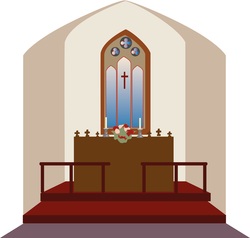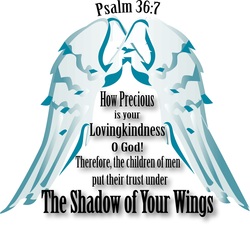
"The Missionary City"
"And to the angel of the church in Philadelphia write,
'These things says He who is holy, He who is true, "He who has the key of David, He who opens and no one shuts, and shuts and no one opens":* "I know your works. See, I have set before you an open door, and no one can shut it;* for you have a little strength, have kept My word, and have not denied My name. Indeed I will make those of the synagogue of Satan, who say they are Jews and are not, but lie — indeed I will make them come and worship before your feet, and to know that I have loved you. Because you have kept My command to persevere, I also will keep you from the hour of trial which shall come upon the whole world, to test those who dwell on the earth. Behold,* I am coming quickly! Hold fast what you have, that no one may take your crown. He who overcomes, I will make him a pillar in the temple of My God, and he shall go out no more. I will write on him the name of My God and the name of the city of My God, the New Jerusalem, which comes down out of heaven from My God. And I will write on him My new name. "He who has an ear, let him hear what the Spirit says to the churches."'
Introduction: Philadelphia
Philadelphia (the city) was the only Pergamenian foundation among the Seven Cities. It derived its name from Attalus II, 159–138 B.C., whose truth and loyalty to his brother Eumenes won him the epithet Philadelphus. The district where it was situated, the valley of the Cogamis, a tributary of the Hermus, came into the possession of the Pergamenian King Eumenes at the treaty of 189.
Philadelphia stood about 25 miles south-cast from Sardis, in the plain of Hermus, and about midway between the river of that name and the termination of Mount Tmolus. It was the second city in Lydia, and was built by King Attalus Philadelphus, from whom it received its name. In the year 133 B.C. the place passed, with the country in the vicinity, under the dominion of the Romans. The site is reported by Strabo to be liable to earthquakes, but it continued to be a place of importance down to the Byzantine age; and, of all the towns in Asia Minor, it withstood the Turks the longest. It was taken by Bajazat, 1392 A.D. "It still exists as a Turkish town, under the name of Allah Shehr, 'City of God,' that is, the 'High Town.' It covers a considerable extent of ground, running up the slopes of four hills, or rather of one hill with four flat summits.
Philadelphia was founded more for consolidating and regulating and educating the central regions subject to the Pergamenian kings. The intention of its founder was to make it a centre of the Graeco-Asiatic civilisation and a means of spreading the Greek language and manners in the eastern parts of Lydia and in Phrygia. It was a missionary city from the beginning, founded to promote a certain unity of spirit, customs, and loyalty within the realm, the apostle of Hellenism in an Oriental land. It was a successful teacher. Before A.D. 19 the Lydian tongue had ceased to be spoken in Lydia, and Greek was the only language of the country.
If sufficient information had been preserved about the religion of Thyatira and Philadelphia, it would have been possible to understand and describe the nature of those two Graeco-Asiatic cities and to specify the difference in character between a Seleucid and a Pergamenian foundation. From the religious establishment of each city, it would have been easy to distinguish what elements in each were native Anatolian, what were introduced from Europe, and what were brought in by colonists from Oriental lands, and how these were blended to produce a composite Graeco-Asiatic religion corresponding to the purposes which the new cities were intended to serve. This would be an object-lesson in practical government and religion, for those two cities are types of the fusion of Greek and Asiatic thought and custom, as attempted by the two chief Hellenising kingdoms in the Asiatic continent.
One solitary pillar has been often noticed, as reminding beholders of the remarkable words in the Apocalypse - 'Him that overcometh I will make a pillar in the temple of my God'" The town is the seat of a Greek archbishop, with about twenty inferior clergy. The streets are narrow, and are described as remarkably filthy. The engraving in this volume will give a representation of the town as it now appears.
How Christ Addressed this Church:
Revelation 3:7
"These things saith he that is holy, he that is true, he that hath the key of David, he that openeth, and none shall shut, and that shutteth, and none openeth".
This message couldn't have come from anybody but "Jesus Christ", because it is in HIM holiness eternally dwells, originates, and all holiness is derived. Jesus Christ is the fountain of truth; He is God and because of that, even though God made man, he is not like man, thus cannot lie nor be imposed on; HE is the one from whom all truth proceeds; and whose veracity in his Revelation is unimpeachable.
The "Key" , according to the Bible Explorer Commentary on this church is: the "emblem of authority and knowledge". The key of David is the regal right or authority of David. David could shut or open the kingdom of Israel to whom he pleased. He was not bound to leave the kingdom even to his eldest son. He could choose whom he pleased to succeed him. Both the kingdom of the Gospel, and the kingdom of heaven, are at the disposal of Christ. He can shut against whom he will; he can open to whom he pleases. If he shuts, no man can open; if he opens no man can shut.
It's important to remember that anything the LORD makes a determination on, HIS principles, preciepts, statues and declarations are final and, irreversible!. This "expression" is an allusion to Isaiah 22:22, where the prophet promises to Eliakim, under the symbol of the key of the house of David, the government of the whole nation; i.e., all the power of the king, to be executed by him as his deputy; but the words, as here applied to Christ, show that everything concerning Jesus Christ is absolute.
Christ's Commendations to The Church: " I know your Works"
The writer of the letter is “he that is true”(Christ); and HE revealed to John that the Philadelphian Church "kept my word and did not deny my name,” but confessed the truth, whereas its enemies are they “which say they are Jews, and they are not, but do lie.” The picture of Philadelphia that is given in the letter marks it beyond all others of the Seven as the holy city, which “I have loved,” which kept my word and my injunction of endurance (a commendation twice repeated). This church was rich in two areas of life: Rich in grace toward God (Luke 12:21) and in good deeds (1 Timothy 6:18).
Revelation 3:8
A. I have set before thee an open door
Jesus opened to this church an "evangelistic door" to proclaim and diffuse HIS word.; And even though there are many adversaries against the spreading of my Gospel and all seek to prevent it, none of them shall be able to prevent it. This conveys the idea that Christ sets before Philadelphia this effectual door, because she has some little strength: rather, He does so, because she has 'but little strength: This church having been under fierce persecution is consciously weak herself, yet she is the fitter object for God's power to rest on her because she has been made "stronger" in Christ under the power of the Holy Ghost because she is "deviod" of much strength of her own. This means all evangelistic work that she does and the keeping of all of the statues of Jesus Christ is and was done in Christ through the Holy Spirit that "Christ may have all the glory, because it all was done in the power of HIS might" and not in the strength of the people so that at any time thy could brag or boast. This opportunity was a special gift and privilege and favour bestowed upon Philadelphia. No commendation of this kind is mentioned for any other city.
B. Thou hast a little strength
This church possessed very little political authority or influence in the region; yet, Jesus said: "thou hast kept my word- meaning this church both taught and kept the "true doctrine", never giving in to the many false teachings in the region; and hast not denied my name", by taking shelter and turning the doctrines steeped in "paganism" when Christianity was fiercely persecuted and their very lives were on the line.
This church fought the good fight They stayed on the correct course and kept the faith. they didn't fall away from the true faith in Christ. They stood and withstood every trial, temptations and persecutions launched at them by the haters and naysayers. they continued to run the Christian race and looked to Jesus as their author and finisher of their faith. The little strength may refer either to the smallness of the numbers, or to the littleness of their grace.
Historically, when Christians were brought before pagan magistrates during times of persecution, they were required to renounce the name of Christ, and to disown him in a public manner. It is possible that, amidst the persecutions that raged in the early times, the members of the church at Philadelphia surely were summoned to trials like these, but they had stood the trial firmly. It would seem from the following verse, that the efforts which had been made to induce them to renounce the name of Christ had been made by those who professed to be Jews, though they evinced the spirit of Satan. If so, then the attempt was probably to convince them that Jesus was not the Christ. This attempt would be made in all places where there were Jews.
Christ "3 Promises" to Philadelphia:
Behold, I will make them of the synagogue of Satan, which say they are Jews, and are not, but do lie.....
1. Behold, I will make them to come and worship before thy feet, and to know that I have loved thee.
The first promise to Philadelphia is "the synagogue of Satan" would not prevail against the faithful in her; and. this churchwhould even win over some of "the synagogue of Satan" to fall on their faces and confess God is in her of a truth. The Apostle Paul wrote in 1 Corinthians 14:24-25:
"But if an unbeliever or someone who does not understand comes in while everybody is prophesying, he will be convinced by all that he is a sinner and will be judged by all, and the secrets of his heart will be laid bare. So he will fall down and worship God, exclaiming, "God is really among you!"
This shows how Christ set before the Church of Philadelphia an "open door" - some of her greatest adversaries, the Jews, being brought to the obedience of faith. Their worshipping before her feet expresses the converts' willingness to take the lowest place in the Church, paying homage to Christ and honor to those whom once they persecuted, rather than dwell with the ungodly.
Second, "Because thou hast kept the word of my patience,
2. I also will keep thee from the hour of temptation, which shall come upon all the world, to try them that dwell upon the earth".
Patience. 'The word of my persevering endurance' is my Gospel word, which teaches it in expectation of my coming (Revelation 1:9). My endurance is the endurance which I require and I practice. Since Christ as our Great High Priest and intercessor now endures, patiently waiting until the usurper be cast out, and all "His enemies be made His footstool." in like manner, His "Philadelphian Church," for the joy before her of sharing His coming kingdom, endures patiently.
Christ's final message to the Church: According to Barnes Commentary
"Behold, I come quickly" : Hold on to the profession of your faith and stand having done all to stand. Keep on the whole armor of God that you will be able to stand
[That no man take thy crown] The crown of life appointed for all who are true believers. The truth which is taught here is, the crown of life will not be taken because of negligence or unfaithfulness in duty; that is, we may be deprived of the glory which we might have obtained if we had been faithful to our God and Saviour. We need to be on our constant guard, that, in a world of temptation,where the enemies of truth abound, we may not be robbed of the crown that we might have worn forever.
"Him that overcometh will I make a pillar in the temple of my God, and he shall go no more out: and I will write upon him the name of my God, and the name of the city of my God, which is new Jerusalem, which cometh down out of heaven from my God: and I will write upon him my new name".
I Will make a pillar in the temple of my God
God honors and rewards faithfulness.Christ's promised that the reward this church would receive is "honor". Every member who was victorious in the end would be honored as if he were a pillar or column in the temple of God. Such a pillar or column was partly for ornament, and partly for support; and the idea here is, that in that temple he would contribute to its beauty and the justness of its proportions, and they would see the same time be honored as if he were a pillar which was necessary for the support of the temple. It is not uncommon in the New Testament to represent the church as a temple, and Christians as parts of it.
And he shall go no more out because...
1. He shall be permanent as a part of that spiritual temple.
The main truth here is, that if we reach heaven, our happiness will be secure forever. We shall have the most absolute certainty that the welfare of the soul will no more be perilled; that we shall never be in danger of falling into temptation; that no artful foe shall ever have power to alienate our affections from God; that we shall never die.
Note: Though we may change our place, and may roam from world to world until we shall have surveyed all the wonders of creation, yet we shall never "go out of the temple of God." (John 14:2) doubts at an end.
As soon as we cross the threshold we shall be greeted with the assurance, "he shall go no more out forever." That is to be our eternal abode, and whatever of joy, or felicity, or glory, that bright world can furnish, is to be ours. What a joyous moment when all the saints of God, emerges from a torrid world of danger and of doubt, to be at eternal rest. Our souls shall settle down into the calmness and peace of that state where there is the assurance of God himself that that world of bliss is to be its eternal abode! The honor thus conferred on him "who should overcome" would be as great as if the name of that God whom he served, and whose favor and friendship he enjoyed, were inscribed on him in some conspicuous manner. The meaning is, that he would be known and recognized as belonging to God; the God of the Redeemer himself-indicated by the phrase, "the name of my God."
The New Jerusalem is the city of his habitation. The idea is: that in this world, and in. all worlds wherever he goes and wherever he abides, he will be recognized as belonging to that holy city; as enjoying the rights and immunities of such a citizen..Jerusalem was the place where the temple was reared, and where the worship of God was celebrated. According to the scholars, it came to be synonymous with the church,the dwelling-place of God on earth which cometh down out of heaven from my God. The idea is plain. It is:
(1) that the church is, in accordance with settled Scripture language, represented as a city-the abode of God on earth.
(2) That is, instead of being built here, or having an earthly origin, it has its origin in heaven.
It is as if it had been constructed there, and then sent down to earth ready formed. The type, the form, the whole structure is heavenly. A city will be literally reared for the residence of the saints. It is, that a great and splendid city, such as that described in Revelation 21, will literally come down from heavens.
Finally
And I will write upon him my new name
Conclusion:
The reward, therefore, promised here is, that he who, by persevering fidelity, showed that he was a real friend of the Saviour, would be honored with a permanent abode in the holy city of his habitation, In the church redeemed and triumphant he would have a perpetual dwelling; and wherever he should be, there would be given him sure pledges that he belonged to him, and was recognized as a citizen of the heavenly world. To no higher honor could any man aspire; and yet that is an honor to which the most humble and lowly may attain by faith in the Son of God.







 RSS Feed
RSS Feed